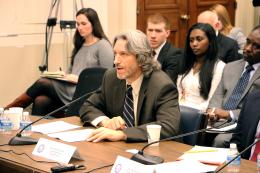
Testimony of John Prendergast, Founding Director of the Enough Project, before the United States Congress Tom Lantos Human Rights Commission hearing on “Human Rights Violations in Sudan,” given on March 4, 2015.
Congressman Pitts, McGovern, and other members of the Lantos Commission, thank you for the opportunity to testify on Sudan. The depressing truth is that an earlier Congressional hearing would have heard the same testimony about Darfur ten years ago, or about the Nuba Mountains fifteen years ago, or about civil society getting crushed by the Sudan government twenty years ago.
Just as tragically, the energy for an imaginative response to the unparalleled human suffering of the Sudanese people has dwindled over the years. In the context of protracted conflict emergencies, especially one like Sudan that has lasted for decades, it is not uncommon for the international community to slowly disengage. Officials claim – and seem to actually believe – that no leverage exists to alter the situation on the ground. Lifeless peace processes are given occasional CPR to maintain the appearance of movement. Critically needed humanitarian band-aids and sincere appeals to stop the killing become substitutes for a more muscular policy.
In Sudan, this dearth of imaginative policy options results from dealing with a brutal regime in Khartoum that for two and a half decades has maintained power through an unwavering commitment to the destruction of its armed and unarmed opponents. Meanwhile, the regime has exhibited an unbounded willingness to talk and negotiate, leaving everyone with the impression that the fundamental issues of power, wealth and identity of the country are indeed up for negotiation. The problem, of course, is that none of these issues are negotiable given the current calculations the regime has made. Therefore, the only way to support progress in Sudan is to alter those calculations.
After studying this regime for 25 years, it is my conclusion that the Khartoum government is most vulnerable to targeted, focused, relentless economic and financial pressure. Therein lies the greatest opportunity for American leverage to be deployed in support of peace and human rights in Sudan.
Click the link below to read the full testimony.
Photo credit: Erik Leaver, United to End Genocide.

